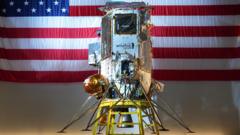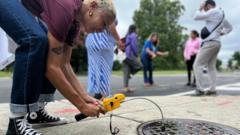Trinidad's renowned carnival faces environmental challenges, with initiatives like Carnicycle and 2nd Closet promoting costume recycling and the use of biodegradable materials, significantly reducing waste and emissions.
Trinidad's Carnival Embraces Eco-Friendly Innovations

Trinidad's Carnival Embraces Eco-Friendly Innovations
Local initiatives are working to make the vibrant celebrations of Trinidad's carnival more sustainable, minimizing waste and carbon emissions.
From the vibrant streets to extravagant costumes, Trinidad's carnival is often dubbed "the greatest show on Earth" but is now facing scrutiny for its environmental footprint. It has been estimated that the event generates approximately 3.4 tonnes of waste annually, a figure that has sparked a movement towards more sustainable festivities, spearheaded by local initiatives like Carnicycle. Co-founded in 2018 by Danii McLetchie, Carnicycle aims to mitigate the environmental impact associated with the costumes and paraphernalia used during the celebrations.
Carnival costumes, typically adorned with feathers and sequins, each come with a hefty carbon footprint; simply producing and transporting a single costume bra can produce around 37.68 kg (83 lb) of CO2 emissions, according to calculations provided by the sustainability-focused tech company Doconomy. Danii expresses growing concern over these emissions as they monitor participant numbers, which often reach into the tens of thousands each year.
In an effort to tackle this issue, Carnicycle has established a recycling program that collects unused costumes that would otherwise be discarded or incinerated. By placing collection bins at various hotels and event venues, they encourage masqueraders to donate costumes for reuse. The program has reportedly salvaged around 10,000 costume pieces, allowing materials like feathers and beads to find new life, instead of ending up in landfills.
Additionally, Carnicycle offers a rental service for large backpack accessories often worn in the parades. They aim to alleviate the financial burden associated with these pricey items, which can cost up to $700 (£550), by allowing masqueraders to rent these for photo opportunities without the burden of carrying them throughout the parade.
Meanwhile, two women, lawyer Aliyah Clarke and fashion designer Kaleen Sanois, are making strides in promoting sustainability through their side venture, 2nd Closet, a pop-up thrift store for pre-owned clothing. Their initiative also involves creating video guides focused on transforming carnival costumes into fashionable outfits suitable for various occasions.
Celebrating their success, they were recently invited to curate a secondary market for clothing from Machel Montano, a premier figure in the Soca music scene. The strong public interest highlights the growing acceptance of recycled and thrifted apparel.
Additionally, at notable events such as Fete with the Saints, biodegradable utensils are being used, and organizers employ "bin detectives" to ensure proper waste sorting. These initiatives have resulted in capturing twice the volume of recyclables compared to previous years, with over five tonnes of glass diverted from local landfills.
Joseph Hadad, co-chairman of the organizing committee, emphasizes that these sustainable efforts have not dampened the festive spirit of the carnival. Patrons like Roland Riley commend these initiatives, marking them as a positive step towards a greener celebration.
With continuous collaboration from various local businesses and organizations, the iconic Trinidad Carnival is evolving, embracing sustainability while maintaining its cultural roots and celebratory essence.






















